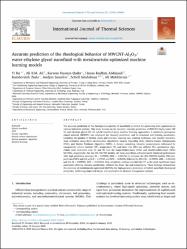Accurate prediction of the rheological behavior of MWCNT-Al2O3/ water-ethylene glycol nanofluid with metaheuristic-optimized machine learning models

Göster/
Erişim
info:eu-repo/semantics/openAccessTarih
2025Yazar
Ru, YiAli, Ali B. M.
Qader, Karwan Hussein
Abdulaali, Hanaa Kadhim
Jhala, Ramdevsinh
Ismailov, Saidjon
Salahshour, Soheil
Mokhtarian, Ali
Üst veri
Tüm öğe kaydını gösterKünye
Ru, Y., Ali, A. B., Qader, K. H., Abdulaali, H. K., Jhala, R., Ismailov, S., ... & Mokhtarian, A. (2025). Accurate prediction of the rheological behavior of MWCNT-Al2O3/water-ethylene glycol nanofluid with metaheuristic-optimized machine learning models. International Journal of Thermal Sciences, 211, 109691.Özet
The accurate prediction of the rheological properties of nanofluids is critical for optimizing their application in various industrial systems. This study focuses on the dynamic viscosity prediction of MWCNT-Al2O3/water (80 %) and ethylene glycol (20 %) hybrid nanofluid using machine learning approaches. A multilayer perceptron neural network (MLPNN) was employed for viscosity prediction, and its structural and training parameters, including the number of hidden layers and neurons, learning rate, training technique, and transfer functions, were optimized using three metaheuristic algorithms: Genetic Algorithm (GA), Particle Swarm Optimization (PSO), and Marine Predators Algorithm (MPA). A dataset containing viscosity measurements influenced by nanoparticle volume fraction (VF), temperature (T), and shear rate (SR) was utilized. The optimization algorithms were evaluated over 10 and 20 runs for single-hidden-layer (1HL) and double-hidden-layer (2HL) MLPNNs, respectively. For the 1HL-MLPNN models, all three algorithms achieved nearly identical performance with high predictive accuracy (R = 0.99992, MSE = 0.00176). In contrast, for 2HL-MLPNN models, PSO outperformed MPA and GA with R = 0.99995 and MSE = 0.00105, followed by MPA (R = 0.99995, MSE = 0.00123) and GA (R = 0.99992, MSE = 0.00160). Also, sensitivity analysis revealed the VF as the most significant input parameter affecting viscosity predictions, followed by shear rate and temperature. These findings demonstrate the potential of metaheuristic-optimized MLPNNs for high-accuracy prediction of hybrid nanofluid rheological properties, facilitating improved design and application in thermal management systems.
















